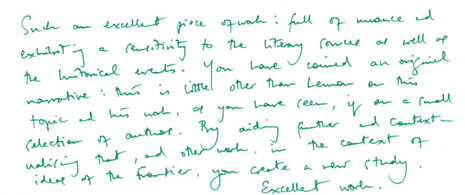Plagiarising professor stays in post and threatens student journalists
More than twelve pages of an article published under O’Reilly’s name had been lifted almost word for word from two essays by one of his students

A Cambridge professor resorted to legal threats and lies to stop this newspaper from publishing details of a University investigation which upheld a complaint that he plagiarised his student’s essays.
Dr William O’Reilly, an associate professor in early modern history, threatened Varsity with legal action if the newspaper reported that he had been found to have copied one of his undergraduate’s supervision essays.
O’Reilly’s solicitor said that any such claim was “demonstrably wrong” and had “no factual basis.”
After further inquiries by Varsity, however, O’Reilly’s solicitor conceded in August that the complaint of plagiarism had been upheld by the University, and that he would not have any grounds to pursue legal action if it were to be reported.
The Financial Times initially reported that the complaint of plagiarism had been upheld by a university tribunal, but that the professor would keep his job. Following a two-year investigation, the tribunal ruled that the offence was “the product of negligent acts but was not deliberate.”
Documents seen by Varsity show that more than twelve pages of an article by O’Reilly, published in the Journal of Austrian-American History, had been lifted almost word for word from two essays by one of his students.


O’Reilly, who was the student’s supervisor, had originally commended the essays for their ingenuity. In written feedback, he told the student: “Such an excellent piece of work [...] You have coined an original narrative [...] You create a new study.”
The student who wrote the essays told Varsity that he was “incredulous” when he found out the plagiarism was deemed negligent.
The student only realised O’Reilly had been passing off his work as his own three years after the journal article had been published. The student submitted a complaint to the University in 2021.
He described the whole disciplinary process as “not fit for purpose,” adding: “I haven’t had an apology from the University for the fact Dr O’Reilly presented my work as his own.”
In his initial letter to Varsity, O’Reilly’s lawyer made several other claims about the dispute. He said: “you should be aware that the University of Cambridge has already written to the editor of the Financial Times to complain about the factual inaccuracies in their article.”
Varsity has since learned that the University did not seek any correction relating to O’Reilly’s plagiarism. O’Reilly also claimed that one of the panellists on the tribunal had described the complaint of plagiarism as “absurd.”
In documents seen by Varsity, the professor told the university tribunal that he was “devastated to realise” that he had copied his student’s work.
He said that he had used the work as an “aide-mémoire” to piece together his argument, but that he had planned to rewrite the article in his own words.
He told the tribunal: “I firmly believe that I copied the material in my planning of the article, intending to use it only in a placeholding way, serving to remind me of the structure I planned to follow.”

Sidney in court over access disputes
The student told Varsity: “I spent over two years going through the University’s complaints process and despite my complaint being upheld, they have refused to explain how they reached the conclusion of accidental plagiarism.”
A spokesperson for the University said: “It would be inappropriate to comment in detail on allegations against a member of staff. The [journal] article in question has been withdrawn.”
“Under established procedures, a panel of independent members of the University has considered the issues and the matter is now concluded. We will not be commenting further.”
O’Reilly provided the following abridged statement: “This matter has been investigated for nearly two years. I have never denied that in a situation of extreme personal difficulty I inadvertently used material from two student essays stored on my computer, both relating to a subject on which I have published and taught for over 25 years. In February 2023, after a three-day hearing and having reviewed over 800 pages of evidence, a University Tribunal concluded that I had been guilty of negligence but that I had not set out to deceive.”
“It recognised that there were strong mitigating circumstances. The Tribunal therefore upheld the complaint but, since the plagiarism was negligent rather than deliberate, imposed a proportionate penalty and recommended that I should be allowed to return to work this Michaelmas Term.”
 News / Cambridge academics sign open letter criticising research funding changes22 February 2026
News / Cambridge academics sign open letter criticising research funding changes22 February 2026 News / Supporters protest potential vet school closure22 February 2026
News / Supporters protest potential vet school closure22 February 2026 News / University Council rescinds University Centre membership20 February 2026
News / University Council rescinds University Centre membership20 February 2026 News / Hundreds of Cambridge academics demand vote on fate of vet course20 February 2026
News / Hundreds of Cambridge academics demand vote on fate of vet course20 February 2026 News / Union cancels event with Sri Lankan politician after Tamil societies express ‘profound outrage’20 February 2026
News / Union cancels event with Sri Lankan politician after Tamil societies express ‘profound outrage’20 February 2026









